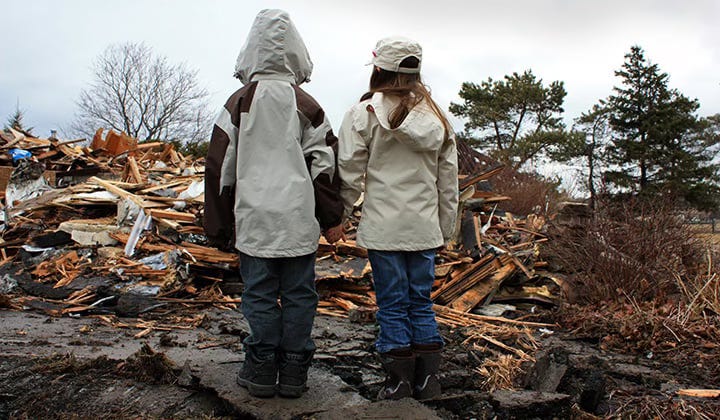Anyone under 40 will experience extreme weather conditions that no one has witnessed before.
We can take action to prevent this grim future.
There are more than three billion children and young people under the age of 25 today. Most of them will face unprecedented exposure to heatwaves, crop failures, floods, droughts, wildfires, and tropical cyclones in their lifetimes, according to a landmark study in the science journal Nature.
Need-to-Know: Youth will face unprecedented extreme weather
“Unprecedented exposure” is defined as climatic events that might occur only once every 10,000 years.
Here’s an example from the study:
Anyone born in Brussels in 1960 and who has spent their life there will experience three extreme heatwaves during their lifetime. However, a child born in Brussels in 2020 and who spends their entire life there will experience 18 heatwaves during their lifetime—an unprecedented exposure—if global warming rises to 2.5 degrees Celsius (C).
In other words, a young child today will be forced to endure 6 times as many extreme heatwaves as their 50-something parents, aunts, uncles, or grandparents will over their lifetimes.
We’re on course for 2.7 degrees C with our current level of emissions.
Need-to-Know: When a child born in 2020 is 60 years old, it could be 2.7 degrees C hotter.
I have kids. My grandkids were born in 2017 and 2020. I’m having a hard time wrapping my mind around this.
The younger a person is, the higher the likelihood of unprecedented exposure to climate extremes.
— Luke Grant, co-author of the study and a climate researcher at the Universiteit Brussel, Brussels, Belgium
It doesn’t have to be this way.
Reducing CO2 emissions to near zero will dramatically reduce the levels of extreme weather our kids and grandkids will have to endure.
Here are three things you and I can do today:
Walk, bike, or use public transportation (bus or train) instead of driving. Limit your flying. Transportation is the first or second largest source of CO2 emissions in most countries
Eat less meat, especially beef, along with limiting dairy consumption. Buy local, organic when you can. Food production is a major source of CO2 emissions and the biggest driver of deforestation.
Talk to people: “Like most people, I am worried about how badly global warming will impact young people, so I’m doing what I can, like xyz.”
Let them know that more than 80% of people in nearly every country want stronger climate actions from their government and corporate leaders, despite the headlines. (See: The 89% Climate Solution: A majority of people know climate change is a serious threat to our health.)
Here are three things we can do tomorrow and the day after:
If you have two cars, get rid of one.
Electrify everything: heat pumps, water heaters, stoves (induction stoves are big energy savers), electric vehicle (An EV Uprising), E-bike/scooter (Micromobility: An Urban Transportation Revolution), lawn mower/trimmer. Better yet, replace your grass with native plants. See: Rewild Your Yard
Support and participate in local groups that are making a difference.
Until next time, be well and do something to help, you’ll feel better.
Stephen





This is a good, concise post, which supports a worthy cause.
One point that you raise demands some further examination: "...more than 80% of people in nearly every country want stronger climate actions from their government and corporate leaders, despite the headlines."
This is either not a meaningful statistic, or (at the very least) we damage the cause of activism by not pursuing it further. It is all very well to say that 80% of people want stronger climate actions. The point is that they are part of the 90+% whose values and lifestyles cause climate change in the first place. More to the point, it can easily be shown that significantly less than 50% of those people are willing to vote for a government that would implement such actions.
Urging people to action is a noble pursuit. But we are well past the "awareness" threshold. What is needed is to ask *WHY* more meaningful change actions are not happening. Those are the questions that I want to explore - and have attempted to do so at "The Value Crisis" substack, (in "Climate Change. What's the problem?"), found at https://thevaluecrisis.substack.com/p/climate-change-whats-the-problem.
I would greatly value your thoughts on this.